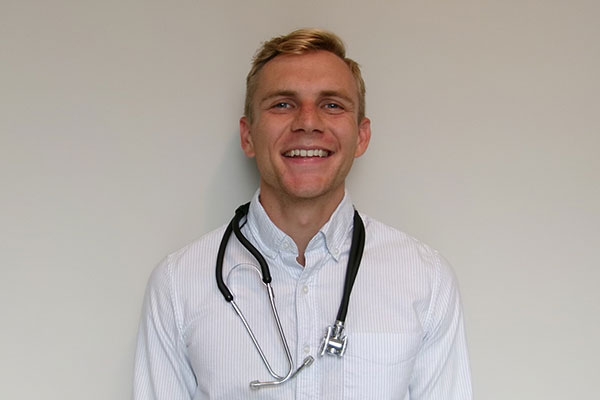“The pandemic made me realize how essential good health care is and it's been exciting to be a part of that,” says Jeff Peeler, a 2020 program alumnus of our Post-Baccalaureate Health Professions Program and current graduate nursing student at the University of San Francisco. “The rise of digital health has been an eye-opener, too. I think telehealth, remote monitoring and machine learning all improve health care quality and make it more patient-centered. I think it's a great time to enter the field.”
Indeed, there’s no time like the present to consider moving into a nursing position. The Bureau of Labor Statistics projects a nine percent job growth until 2030, citing around 194,500 openings for registered nurses each year.
Whether it’s because current nurses are leaving the field or retiring, or there will be a need for more skilled staff to care for Baby Boomers as they age, there is a clear signal that if you’re interested in becoming a nurse, now is the time to pursue that dream.
But which path to choose?
We break down the various roads to nursing and how our courses can make you a competitive applicant.
Nursing Assistant, Nursing Aides, Certified Nursing Assistants (CNA), Clinical Medical Assistants (CMA)
If you’re looking to get started in the nursing field, this may be a great first spot. While not technically nurses, nursing assistants and medical assistants serve on the front lines between medical staff and their patients. Their job duties usually center on helping a patient perform daily activities of living—such as bathing, using the bathroom and dressing—measure vital signs and listen to their health concerns.
To become a CNA, you must complete a state-approved education training program (three to eight weeks to complete) and pass an exam. Medical assistants may train in an approved program or in a clinical setting under physician supervision.
To be admitted to CNA program, you must hold a high school diploma
Licensed Practical Nurse (LPN), Licensed Vocational Nurse (LVN)
These nurses manage a variety of patient duties that are associated with monitoring a patient’s health and administering basic care. They communicate with their patients—and sometimes the patient’s family—about the care plan.
LPNs also administer many types of medications, though not intravenously.
To become an LPN, you must complete a state-approved program (expect around a 1-year commitment) and pass the National Council Licensure Examination (NCLEX-PN) to receive your state license and be qualified to work.
To be admitted to an LPN or LVN program, you must hold a high school diploma.
Registered Nurse (RN)
When you think of the term “nurse,” you’re most likely imagining a registered nurse. These professionals provide and coordinate patient care, educate patients and the public about various health conditions, and provide advice and emotional support to patients and their families. Usually working as part of a team of physicians and other health care specialists, RNs also manage LPNs and CNAs. RNs also have the opportunity to focus their care on specific audiences, such as pediatrics.
There are three levels of nursing degrees to attain the RN position:
You’ll also need to pass the National Council Licensure Examination.
Our Post-Baccalaureate Health Professions Program provides the needed courses to become a competitive applicant to an RN program.
Alumna Erica Situ is now attending Emory University’s Masters of Nursing Program, followed by a Master of Science in Nursing that will allow her to license as a Family Nurse Practitioner. “Coming out of the post-bacc program,” she says, “I can confidently say that the knowledge I’ve gained from my health professions classes is up to date and applicable to the nursing field. Learning under the instructors at UC Berkeley Extension has given me a solid foundation of knowledge that I will use to deliver quality care to my patients in the future.”
Courses and Program to Make You Competitive
General Human Anatomy
Human Anatomy Laboratory
Introduction to Human Physiology
Human Physiology Laboratory
Medical Microbiology
Microbiology Laboratory
Oral Communication: The Psychology of Public Speaking
Developmental Psychology Across the Lifespan
Chemistry
Writing
General Psychology
Post-Baccalaureate Health Professions Program
Advanced Practice Registered Nurses (APRNs)
Those who earn a Master of Science in Nursing (MSN), Doctor of Nursing Practice (DNP) or a Ph.D. in Nursing can become advanced practice registered nurses (APRNs). In addition to performing all of the duties handled by an RN, APRNs level-up their work with ordering and evaluating test results, referring patients to specialists, and diagnosing and treating ailments. APRNs can also go into speciality areas, such as certified nurse-midwives (CNM), clinical nurse specialists (CNS) or certified registered nurse anesthetists (CRNA). Nurse practitioner specialities include pediatrics, family, adult, geriatric, emergency room, and psychiatry and mental health.
Outside of a clinical setting, RNs can elect to become a nurse educator or move up the ranks into a leadership position as a Director of Nursing or Chief Nursing Officer.
Prerequisite to be admitted to APRN program: Hold an active RN and a bachelor’s degree or higher
Ready to start on your journey to an exciting career in nursing? Then start with a course or apply for our Post-Baccalaureate Health Professions Program!



